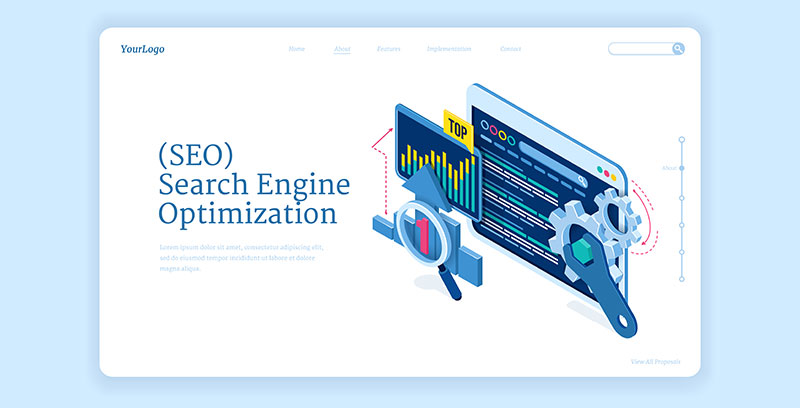In the ever-evolving world of digital marketing, SEO (Search Engine Optimization) continues to be one of the most effective strategies for driving organic traffic. However, even seasoned professionals often fall prey to common SEO mistakes, hindering the performance of their websites. To succeed in SEO, you need to avoid these pitfalls. In this article, we’ll break down the most prevalent SEO mistakes that businesses make and how to avoid them to improve your website’s ranking on search engines.
1. Ignoring Keyword Research
One of the most significant SEO mistakes is neglecting proper keyword research. Without an in-depth understanding of the keywords your audience is searching for, your content may not be visible to potential visitors. Proper keyword research helps identify what terms and phrases are being searched by your target audience, allowing you to craft content that directly answers those queries.
Solution:
To avoid this SEO mistake, invest time in keyword research using tools like Google Keyword Planner, Ahrefs, or SEMrush. Ensure that your target keywords align with your audience’s intent and use them naturally within your content.
2. Overusing Keywords (Keyword Stuffing)
Keyword stuffing, or overusing target keywords in your content, is another critical SEO mistake. This outdated practice can result in search engines penalizing your website, significantly lowering your rankings. It creates a poor user experience and sends a red flag to search engine algorithms that your content is trying to manipulate rankings.
Solution:
Rather than stuffing your content with keywords, aim for a natural keyword density and focus on providing valuable, well-written content. Use synonyms and related terms to avoid repetition while ensuring your content remains relevant to the SEO keywords you are targeting.
3. Not Optimizing for Mobile Users
With the majority of users accessing websites via mobile devices, failing to optimize your site for mobile users is a major SEO mistake. Google has shifted to mobile-first indexing, meaning that the mobile version of your website is considered the primary version for ranking purposes.
Solution:
Ensure your website is fully responsive, providing an excellent user experience across all devices. Use tools like Google’s Mobile-Friendly Test to check if your site is optimized for mobile. A responsive design not only improves usability but also positively impacts your SEO ranking.
4. Neglecting Page Speed Optimization
Slow-loading websites frustrate users and lead to higher bounce rates, which can negatively impact your SEO performance. Page speed is a ranking factor in Google’s algorithm, making this a critical SEO mistake to avoid.
Solution:
To improve page speed, compress images, enable browser caching, and minimize JavaScript and CSS files. Use Google’s PageSpeed Insights to analyze your website’s speed and get recommendations for improvement. Ensuring a fast-loading website helps keep users engaged and improves SEO rankings.
5. Publishing Thin or Duplicate Content
Content is king in SEO, but not all content is created equal. Publishing thin content that provides little value or duplicate content that’s already found elsewhere on the web is a costly SEO mistake. Search engines favor original, informative, and well-researched content.
Solution:
Create comprehensive, unique content that thoroughly covers the topics your audience cares about. Avoid copying and pasting content from other websites, and always add value by presenting fresh insights or perspectives.
6. Forgetting About Meta Tags and Descriptions
Many businesses overlook the importance of meta tags and descriptions. This SEO mistake can be detrimental because meta titles and descriptions are the first elements users see in search results. If they are poorly written or absent, users may skip your listing.
Solution:
Craft compelling meta titles and descriptions that include your target SEO keywords and entice users to click on your link. These elements should accurately reflect the content on your page and encourage higher click-through rates.
7. Failing to Optimize for Local SEO (Search Engine Optimization)
Local SEO is essential for businesses that rely on local customers. Failing to optimize for local search is a critical SEO mistake that can prevent your business from showing up in relevant local searches.
Solution:
Ensure your business is listed on Google My Business and other local directories. Use location-specific keywords in your content, and encourage satisfied customers to leave reviews on your Google My Business profile. This will help boost your visibility in local searches.
8. Not Building High-Quality Backlinks
Backlinks from authoritative websites are one of the most important ranking factors for SEO. However, many businesses either neglect to focus on building backlinks or resort to shady tactics, such as purchasing low-quality links. Both are severe SEO mistakes.
Solution:
Focus on earning high-quality, relevant backlinks from reputable sources in your industry. Guest blogging, creating shareable content, and networking with influencers in your niche can help build a strong backlink profile that improves your website’s authority and SEO ranking.
9. Overlooking Technical SEO
Technical SEO refers to the behind-the-scenes elements that make your website accessible and easy for search engines to crawl. Ignoring technical SEO is a common SEO mistake that can prevent your site from being properly indexed, regardless of how good your content is.
Solution:
Regularly audit your website’s technical aspects, including the XML sitemap, robots.txt file, and site structure. Ensure your website is free of broken links and has a secure HTTPS connection. Addressing these technical issues will improve your site’s crawlability and SEO performance.
10. Not Monitoring SEO Performance
Finally, one of the most critical SEO mistakes businesses make is not monitoring the performance of their SEO efforts. Without tracking, you won’t know what strategies are working or where improvements are needed.
Solution:
Use tools like Google Analytics and Google Search Console to monitor key SEO metrics, such as organic traffic, keyword rankings, and user behavior. Regularly review your SEO (Search Engine Optimization) strategy and make adjustments based on data-driven insights to ensure continued growth.

